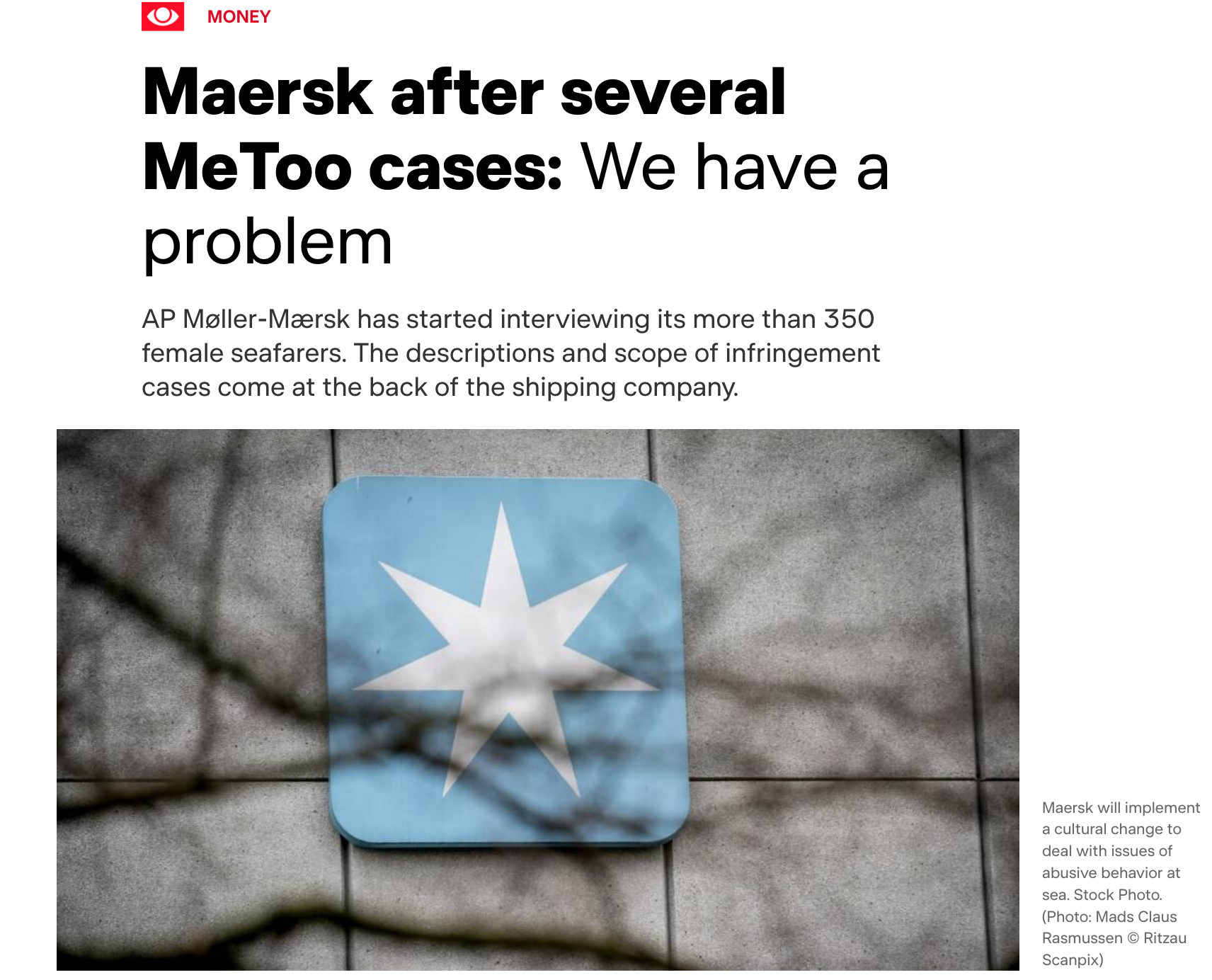Maersk After Several MeToo Cases: “We Have a Problem”
Via: DR.DK, The National Broadcasting Corporation of Denmark
June 13, 2022
By:Astrid Ildor & Jakob Ussing
Translated from Danish to English via Google Translate
AP Møller-Mærsk has started interviewing its more than 350 female seafarers. The descriptions and scope of infringement cases have surprised the shipping company.
After DR News on Sunday reported about 31-year-old Ashley Codrington, who received a number of inappropriate messages from her captain on board one of Maersk's ships , Maersk now acknowledges that the shipping company has a problem with abusive behavior among employees at sea.
- The extent of the problem has surprised, says fleet manager Palle Laursen.
He says that AP Møller-Mærsk, on the basis of an alleged rape case in the autumn, has begun interviewing its more than 350 female employees who work at sea.
- In this connection, there have been a number of more cases, which we are investigating thoroughly, he says.
How many more cases have come up?
- I do not want to give a specific figure, but enough for us to acknowledge that we have a problem, answers Palle Laursen, who is responsible for all of Maersk's ships.
An absolute top priority
At the beginning of the year, AP Møller-Mærsk fired five employees in connection with accusations of rape committed against a 19-year-old female cadet.
And yesterday, DR Nyheder was able to report on another case in which a female ship chef received several text messages from the captain of the Maersk ship she was working on.
Among other things, captain Ashley Codrington urged to send picture of herself when she came out of the bath.
After Ashley Codrington complained to Maersk's management, she was asked to arrange a meeting with the captain herself and talk things through.
Palle Laursen will not comment on the individual cases, but he acknowledges that the shipping company's handling infringement cases has not been good enough.
- We just have to admit that what we have done in the past has been insufficient . That is why we are now making a massive effort with a number of targeted initiatives to create a cultural change on board our ships, says the fleet commander.
In addition to talks with all female seafarers, Maersk is introducing courses to combat abusive behavior for all employees and managers at sea.
The naval chief also says that a hotline has been set up where employees can contact around the clock , and "dedicated resources" have been employed to implement the cultural change.
- We have an issue that we are working on solving, and that piece of work has not yet been completed, but we have put enormous efforts into getting us to move in this area, says Palle Laursen.
- When such incidents come up, they make us enormously sad, and it is clear to feel throughout the organization how much it is contrary to the values we have. It is our absolute top priority to get the work done on this as soon as possible, he adds.
The consequence of insulting another employee is therefore also a dismissal notice:
- If it is judged that a person has had an inappropriate behavior or has violated our set of rules, well then our paths diverge, says the naval chief.
That is, are you simply firing people if they have offended others?
- Yes we do.
MeToo showdown in Swedish shipping
In Sweden, the MeToo wave has recently washed over the maritime industry, and more than a thousand women have shared stories of how they have experienced harassing behavior from colleagues at sea.
This is what Cecilia Österman, a working environment researcher at the Maritime College in Kalmar, says.
- There have been examples of young girls as young as 17 years old who have experienced drunk men crawling into their bunks, she says.
- There was also a woman who told about a colleague who stuck a penis in the neck of her while other employees just laughed at it.
According to a literature study of research in the field, which Cecilia Österman has helped to carry out, between 8-25 percent of everyone who works at sea has experienced bullying or harassment . Among female employees, more than every other person has been subjected to bullying, sexual harassment or other forms of unwanted attention.
- Studies have been done in different parts of the world, so we know that it is a global problem, she says, adding that the scope has largely not changed since 1995, when the first studies were conducted.
According to the work environment researcher, cross-border behavior is experienced as extra intimidating at sea, as the victim does not have the opportunity to get away or seek advice from family, friends or professionals.
- In fact, the most common offender is the closest boss. In the Swedish studies, we have several women who have been visited during the night. When you have a boss who can lock himself in with the master key, then you have nowhere to be safe, says Cecilie Österman.
She urges shipping companies to introduce regular inspections and controls and, in general, to do more to prevent cross- border behavior .
In Denmark, no systematic studies have been carried out of how widespread bullying and harassment are among employees working at sea.
